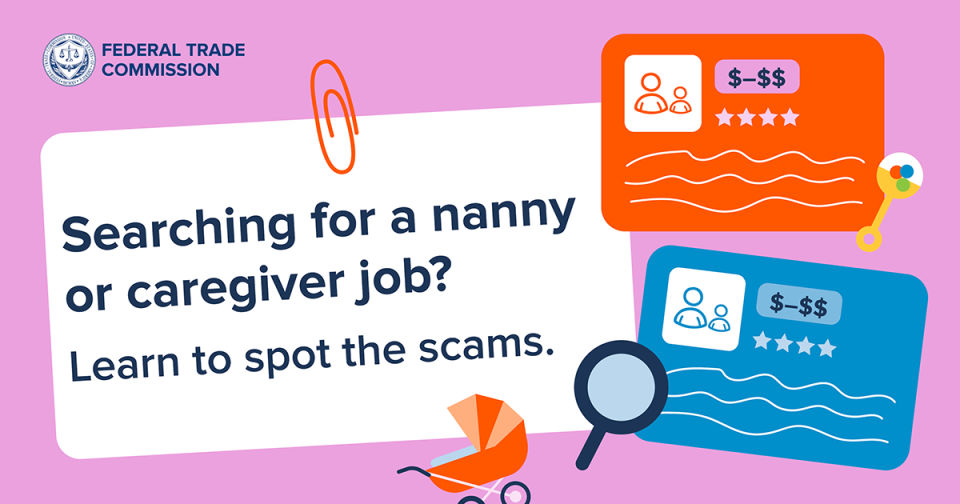As a nanny or caregiver, you know that families and employers trust you to take care of their children or older adults. It’s the same trust that scammers want to build with you when they post ads for fake jobs to steal your money and personal information. So how do you spot the scam?
Here’s how it works. You see an ad for a job, maybe at a job site, and apply. The “employer” sends you a check upfront and tells you to deposit it. “Keep part of the money,” they say, and send the rest to buy supplies or even toys for the children in your care. Don’t do it — while the position seems real, it’s not. It’s a scam. Days later, you’ll find out from your bank that the check was fake, and you’ll lose any money you sent. Then you’ll be stuck repaying the money to the bank.
Here are more ways to spot and avoid phony nanny or caregiver jobs:
- Don't send money to someone who says they want to hire you. An honest employer will never send you a check and then tell you to send them, or someone else, part of the money. That’s a scam.
- Don’t feel pressured to act immediately. Scammers want you to act without having time to think about what information you’re giving. Before you provide personal or financial information to a prospective employer, check out their story. Search online to see if others report problems with this employer.
- Talk to someone you trust. Before you give any personal information, describe the offer to them. What do they think?
Report job scams to the job site and to ReportFraud.ftc.gov.


What about the scam caregivers? I've had my fill of them!
In reply to What about the scam… by KAREN
Karen, how are you trying to find a caregiver? Maybe, go through DSHS, long term Aging agency and so on.
Well stated as it applies to so many scenarios. Probably needs to be said and resaid -appreciated!
Just recently retired caregiver here. Some states hire caregivers through DSHS. There is also a Union for them called the SEIU. You may find employment through those 2 sources. You can also verify caregiver jobs through them. You can also verify scams using social media. Specifically, Facebook. Make sure there is a large membership so as not to go to a caregiver scam. You do not need to pay for training or background checks either. You get paid for training. I a also a cybersecurity specialist and a digital forensic expert as well. Caregiving help support me while I went to school.
In reply to Just recently retired… by rick reeves
Very great
information. Thank you for sharing, Rick. I'm sure this information will prove very helpful to many.
How do we stop the phone calls every day starting sometimes at 7:30 A.M. (central time). I let the answering machine take the call, they never leave a message. When tv on I have Spectrum and it shows spam call via caller ID. We get form 4 to sometimes 15 calls usually on weekdays but maybe a couple on Saturday & Sunday and as late at 8:50 P.M. We keep the landline because cell coverage is iffy. Thanks for any advice.
I was a person who was scammed for a website that didn't promise what they offer and didn't meet their needs to the that they promise me and the was onpoint global LLC said they were going to give me a refund if a made a claim and the amount of my claim was 17,000for all the information that got from me was my personal information that they use .so please send me a check to me FedEx or UPS mail.thank you Charlene Jimenez.
The scam is similar for artists.
Someone will see a piece of art online and an email address to contact the artist.
The artist will then receive an email saying something like: "I was up late last night scrolling the internet and came upon the gorgeous painting you created of "Hunter's Moon". Our 50th wedding anniversary is coming up and I want to surprise my wife with that lovely painting. Please email me and tell me the cost of the painting and I will send an immediate check!" You do, the check arrives, and it is made out for much more than you had quoted. You contact them and say you will rip up that check and for them to send you one for the quoted amount, and they say, "Oh no, you just deposit that one and write me another check for the overage".
I was actually just wondering if I could use some of your pictures and content for an elderly scam class that I am putting together? They would be a part of a slideshow?
In reply to I was actually just… by Megan F.
@Megan,
Yes, you can use all the pictures, articles, videos and other information you find on consumer.ftc.gov for your class. Everything on the FTC websites is in the public domain, so it's free to re-use and share in classes, your own newsletter or email, or however works best for you. We also have free online articles & fact sheets about 13 scams that affect older adults, like grandparent scams, unwanted calls, and romance scams. Find those at www.ftc.gov/PassItOn (online articles) and order print copies at www.ftc.gov/bulkorder. If you have more questions, please send another comment. Thanks!